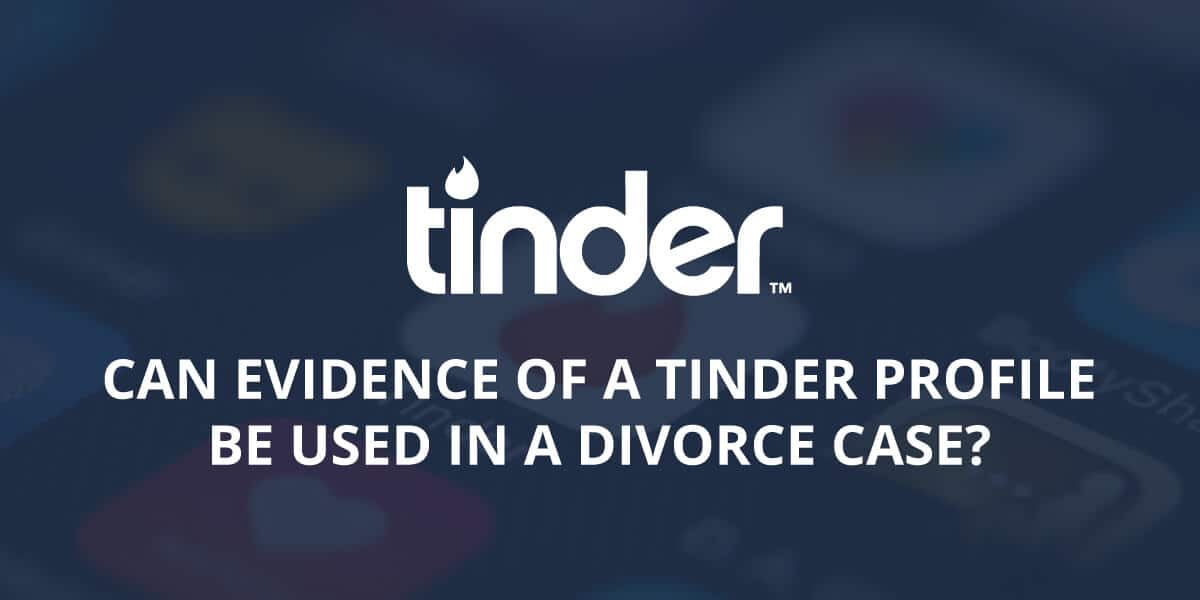Can a Tinder Profile be Used as Evidence in a Divorce?

If you are in the midst of or preparing for a contentious divorce, it is prudent to speak with your divorce attorney about the types of evidence that can be admitted during the proceedings. When most people think of evidence, they think of a gun being presented to a jury during a criminal trial. But this is just the kind of thing you see on TV.
During a divorce, many spouses wonder what their husband or wife can use as evidence against them. There are fewer limits than you may think. Evidence can be all types of things, from physical objects to testimony and electronic data.
Emails, text messages, online content, and electronic information from apps can be admitted as evidence during a divorce so long as the party adheres to the rules of evidence. This includes a Tinder profile or other evidence of you dating while still married.
What Can be Used as Evidence in a Divorce
All kinds of information can be admitted as evidence in court. It all depends on whether that particular kind of evidence is admissible based on the Rules of Evidence. You can review the rules regarding evidence in the Massachusetts Guide to Evidence (2019 edition) and by speaking with a Boston divorce lawyer.
In general, evidence is admissible if it is relevant to the case and it is not overly prejudicial, a waste of time, misleading, confusing, or superfluous. Evidence is relevant if it can make a fact more or less probable that it would be without the evidence and it is important to the case to determine if that fact is true or not.
Evidence can be admissible if it is relevant and obtained lawfully. Illegally obtained evidence will be excluded from a court case. For example, there is an important difference between your spouse asking to admit an email you sent them and your spouse asking to admit emails they found on your computer by stealing or guessing your password.
Evidence must be more than relevant and lawfully obtained. The party asking to admit a certain piece of evidence in court must be able to authenticate it. Authentication means the party can establish that the piece of evidence is what they say it is and not a fake or forgery.
Can a Tinder Profile be Evidence in a Divorce?
In 2010, 81% of the nation’s top divorce lawyers stated they saw an increase in the number of cases using social media evidence in the five years prior, according to a survey by the American Academy of Matrimonial Lawyers. Since 2010, there has been no indication that social media and other electronic evidence has gotten any less popular. Many spouses continue to admit Facebook, Twitter, Instagram, Match.com, OKCupid, Bumble, Tinder, and other social media and online dating content in their divorces.
Whether or not a Tinder profile, or other online data profile, can be admitted to the court during a divorce depends on the factors discussed above.
The first issue is whether the profile is relevant. Your spouse may claim the profile is relevant if they are accusing you of adultery. You may believe your current profile was created after your separation and has no bearing on the divorce. Your divorce attorney can argue against the profile being admitted to court due to irrelevancy.
The second issue is whether your spouse obtained the Tinder profile lawfully. It may be that a friend or family member saw your profile while on the app, screenshot the pictures and text, and send them on to your spouse. However, if your spouse used your phone without permission to look for the app, tell your lawyer immediately.
The third issue is whether it can be authenticated. The other party will have to provide circumstantial evidence that would allow a reasonable judge to conclude the Tinder profile is real. If you did not create the Tinder profile, tell your divorce attorney immediately in order to defend against the admittance of fake and prejudicial evidence.
Do You Want to Use a Tinder Profile as Evidence During a Divorce?
If you are interested in showing your spouse’s Tinder profile, other dating profile, or other social media content in divorce court, you need to speak with your Boston divorce lawyer. You should not use sneaky or suspicious methods to obtain this information. If you do not have it through lawful means, you can discuss obtaining online or electronic information through a subpoena.
Get Help With Your Divorce Right Away
A divorce is always stressful, particularly if you need to prove wrongdoing by your spouse, or your husband or wife alleges you are guilty of adultery or some other harmful or offensive conduct. Our experienced divorce and family law attorneys at Infinity Law Group are here to help. Contact us online or call 617-652-5748 today.
 Infinity Law Group LLC
Infinity Law Group LLC





